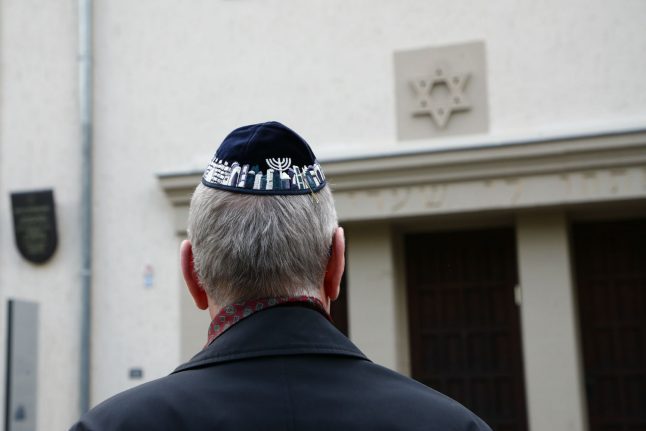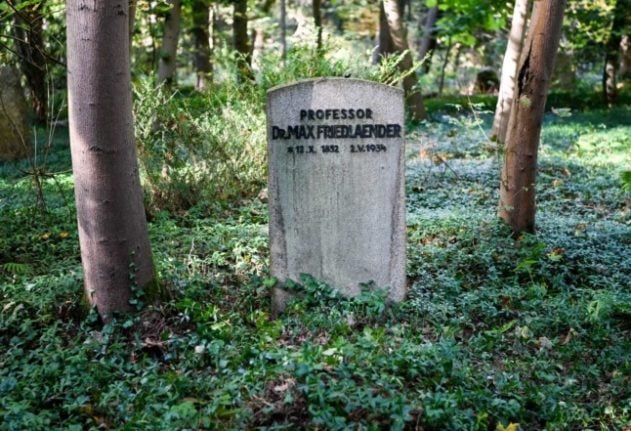“Anti-Semitism has always been here,” said Claudia Vanoni, who is in charge of prosecuting cases targeting Jews.
“But I think that recently, it has again become louder, more aggressive and flagrant,” she told AFP in an interview.
Last September, following a spate of such crimes, the Berlin authorities created the post of anti-Semitism commissioner, appointing Vanoni to the role.
SEE ALSO: Germany steps up fight against anti-Semitism with new reporting centre
More often than not, anti-Semitic insults are posted online on social networks, such as a recent tweet by an alleged supporter of second division club FC Union against the Israeli captain of Ingolstadt.
But others involve physical attacks.
In one prominent case that sparked revulsion, a Jewish teenager was forced to switch schools after being bullied for several months at a top private school in the upmarket Zehlendorf neighbourhood.
In another that made headlines worldwide, an Israeli wearing a kippa was
attacked by a Syrian who lashed at him with a belt in Berlin's trendy Prenzlauer Berg district.
And in the city's upmarket shopping thoroughfare Ku'Damm, an Israeli restaurant owner has suffered regular abuse after posting a video of a man hurling insults at him.
SEE ALSO: For this Berlin restauranteur, anti-Semitic attacks are the norm
Such abuse shows “very clearly to what point anti-Semitism is deeply rooted in our society,” Vanoni said.
But Germany is not alone. In neighbouring France, the number of attacks on Jewish people, and their intensity, have also been increasing.
Ingrained stereotypes
And this bigotry has been encouraged by the proliferation of online platforms that allow people to express such views while hiding behind screens.
“Such acts on the internet are aimed at inciting others,” she said.
Many people no longer feel inhibited.
The presence in parliament of the far-right AfD, whose leaders openly question Germany's culture of atonement over atrocities committed during World War II, has also contributed to the change in atmosphere.
And the arrival of more than a million asylum seekers, many from Muslim countries like Syria, Afghanistan or Iraq, has also contributed to what Chancellor Angela Merkel has deplored as “another form of anti-Semitism”.
SEE ALSO: Are refugees to blame for a rise in anti-Semitism…or are they being scapegoated?
Those holding such bigoted views “come from all strata of society”, Vanoni said.
Some are “stereotypes that have been transmitted from generation to generation”, she explained, pointing to centuries-old tropes about Jews and money.
“Some people have simply internalised these prejudices, without being conscious that these constitute anti-Semitism.”
“Every Jewish person has, at least once, had the experience of someone telling them “you look nothing like a Jew”, she said, pointing out that no-one would ever say that about a Catholic or a Protestant.
With the number of cases multiplying, the legal system often seems hamstrung.
Of 440 complaints filed in Berlin last year, four out of 10 — or 41 percent — had to be shelved for lack of evidence, and only one in five — 19 percent — came before a judge.
The rest were transferred to regional prosecutors as the suspects were not
Berlin residents.
SEE ALSO: 'Drastic increase' of violent anti-Semitic attacks in Berlin, according to figures
Tip of the iceberg
But the legal cases are only the tip of the iceberg as many cases are not reported because the victims “have the impression nothing will happen,” said Vanoni.
And that is her main challenge: working with civil society organisations to build confidence in the system so that victims feel able to approach the courts.
At the same time, it is also about educating the victims about the legal burden necessary to prove a case.
Not all anti-Semitic acts are criminal offences — for instance, a taxi driver who refuses to drive someone on grounds he or she is Jewish cannot be prosecuted. But a verbal insult or an incitement to hatred constitute offences.
Investigations are also complicated by the fact that many acts are carried out anonymously, often online.
In some cases, perpetrators are deemed to suffer from mental problems and not liable before the courts.
Unless the aggressor turns violent, there is little that the justice system can do, Vanoni conceded.
Nevertheless, she stressed the importance of having legal recourse.
“I think we are all concerned when Jews are attacked. We should all react — society, and of course the state,” she said, noting that the justice system must do all “to ensure that anti-Semitic acts are forcefully prosecuted”.



 Please whitelist us to continue reading.
Please whitelist us to continue reading.
Member comments